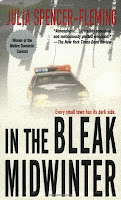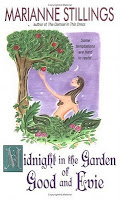TITLE:
What Happens in LondonAUTHOR:
Julia QuinnCOPYRIGHT: 2009
PAGES: 384
PUBLISHER: Avon
SETTING: Regency England
TYPE: Straight romance
SERIES: Not that I know of
REASON FOR READING: After a couple of disappointing books, I haven't been reading JQ in the past couple of years, but the buzz about this one was that it was a return to what we all loved about her.
 Rumors and Gossip . . . The lifeblood of London
Rumors and Gossip . . . The lifeblood of London
When Olivia Bevelstoke is told that her new neighbor may have killed his fiancÉe, she doesn't believe it for a second, but, still, how can she help spying on him, just to be sure? So she stakes out a spot near her bedroom window, cleverly concealed by curtains, watches, and waits . . . and discovers a most intriguing man, who is definitely up to something.
Sir Harry Valentine works for the boring branch of the War Office, translating documents vital to national security. He's not a spy, but he's had all the training, and when a gorgeous blonde begins to watch him from her window, he is instantly suspicious. But just when he decides that she's nothing more than an annoyingly nosy debutante, he discovers that she might be engaged to a foreign prince, who might be plotting against England. And when Harry is roped into spying on Olivia, he discovers that he might be falling for her himself...
What Happens in London started out with dark rumours of murder and a bit of spying, but soon turned into a charming, lovely, character-driven romance.
When one of Olivia Bevelstoke's friends comes to her with the tale that her new neighbour is rumoured to have murdered his fiancee, Olivia doesn't quite believe it. Still, her bedroom window gives her an excellent view of Sir Harry Valentine's study, so the temptation to do a bit of spying on him is too great to resist. And what she discovers is
quite suspicious. What nobleman spends hours and hours closeted in his study, poring over papers, and sometimes wearing strange, plumed hats?
The answer is: a nobleman who speaks fluent Russian and is therefore invaluable to the War Office, not as a spy, but as a translator. Harry is quite aware that Olivia has been spying on him (let's just say she's not the mistress of concealment she thinks she is) and can't resist jerking her around a little bit (for instance, wearing strange, plumed hats while in his study).
Harry might not be a spy, but the War Office has no problem using his abilities when it turns out that his neighbour has started being courted by a mysterious Russian prince. Harry is ordered to approach Olivia and try to overhear anything Prince Alexei says in his presence.
And so starts a romance that is funny, tender and romantic. Harry and Olivia don't particularly like each other at first. In fact, he thinks she's one cold bitch. But once they start spending some time together... wow. When JQ is good, she's really, really, really good. She doesn't just tell us these two are falling in love; we actually see them doing so, and we follow them every step of the way. And it's unmistakeably not just lust (although things do get pretty intense and steamy at times), it's very clearly love. You see them clicking as persons, and just through conversations, you totally get what they see in each other and how they fit perfectly together.
And I was very happy to watch as they did, because I loved them both to bits. I actually quite liked that Olivia is very much a normal debutante. She's intelligent and capable, but she actually likes her life and is perfectly content that her future is to make a good marriage and settle into society. As much as I love reading about women who pushed at the constraints of their time, it was refreshing to read about someone like Olivia.
It's kind of the same with Harry. Even though a description of the plot makes this sound like this is a spy book, Harry isn´t a spy at all. He was a soldier, but now he really is merely a translator for the War Office. And not just that, Harry knows very well that he would absolutely hate being a spy. He even actually says that he doesn't enjoy risk and danger, that even in war, once the battle was over, he felt like hell. Quite refreshing, and amazingly normal for a romance hero!
In addition to a wonderful romance, we get some great secondary characters. Harry's relationship with his brother was interesting. Their father was a drunk, an amiable and non-aggressive one, but JQ is very good at showing exactly how that would still be hell for a child to live with. Harry got out of the house as soon as he could, and his brother resents him for having left him behind, and seems determined to follow in their father's footsteps. There's one particular scene among Harry and Edward that was particularly heartwrenching, and I wish we'd got a bit more resolution in that particular plotline, although it did end in a hopeful note.
Harry's cousin Sebastian was also a fun character, and pretty intriguing, too. I hope the next book is about him, and I'm one who's usually irritated by sequel baiting. Oh, and Prince Alexei was brilliant, as well! He seemed to be headed towards cartoon characterisation at the beginning, but he soon becomes quite human and interesting (if not particularly likeable). For those who've read this already, I think it was about the time when he's so nonchalant about dying by pigeon-pecking, in one particularly hilarious scene.
Speaking of which, have I mentioned how funny, funny, funny this book is? Lovely, gentle humour infuses the whole thing, and it reaches perfection in that scene I mentioned, the scene in the drawing room with Miss Buttersworth and the Mad Baron was hilarious. Watch out for it if you decide to read this. It's literally laugh-out-loud funny, even approaching the mallet-of-death scene in
The Viscount Who Loved Me in perfection.
Ms Quinn, glad to have you back!
MY GRADE: An
A-.
 TITLE: Sundays with Vlad: From Pennsylvania to Transylvania, One Man's Quest to Live in the World of the Undead
TITLE: Sundays with Vlad: From Pennsylvania to Transylvania, One Man's Quest to Live in the World of the Undead TITLE: Being There (read in Spanish, with the title Desde el Jardín)
TITLE: Being There (read in Spanish, with the title Desde el Jardín) TITLE: Superfreakonomics: Global Cooling, Patriotic Prostitutes, and Why Suicide Bombers Should Buy Life Insurance
TITLE: Superfreakonomics: Global Cooling, Patriotic Prostitutes, and Why Suicide Bombers Should Buy Life Insurance Bart Minnock, founder of the computer-gaming giant U-Play, enters his private playroom, and eagerly can't wait to lose himself in an imaginary world, to play the role of a sword-wielding warrior king, in his company's latest top-secret project, Fantastical.
Bart Minnock, founder of the computer-gaming giant U-Play, enters his private playroom, and eagerly can't wait to lose himself in an imaginary world, to play the role of a sword-wielding warrior king, in his company's latest top-secret project, Fantastical.  It isn't easy moving about Society dressed like a dandy-especially when one is a ruthless spy. But that's precisely the latest mission for Liar's Club agent Dalton Montmorecy. Dalton is posing as Sir Thorogood, the elusive cartoonist whose scathing political caricatures have all of London abuzz. The true identity of Sir Thorogood is a mystery, and Dalton hopes that impersonating him will flush out the real menace before his cartoons do further damage to the Crown. Now, if Dalton could only find a way to get the irksome, yet oddly appealing widow, Clara Simpson, off his trail...
It isn't easy moving about Society dressed like a dandy-especially when one is a ruthless spy. But that's precisely the latest mission for Liar's Club agent Dalton Montmorecy. Dalton is posing as Sir Thorogood, the elusive cartoonist whose scathing political caricatures have all of London abuzz. The true identity of Sir Thorogood is a mystery, and Dalton hopes that impersonating him will flush out the real menace before his cartoons do further damage to the Crown. Now, if Dalton could only find a way to get the irksome, yet oddly appealing widow, Clara Simpson, off his trail...  Heavy Snow...Icy Desires...Cold-Blooded Murder
Heavy Snow...Icy Desires...Cold-Blooded Murder Were They Dealing with a Demonic Cult or a Devilishly Clever Killer?
Were They Dealing with a Demonic Cult or a Devilishly Clever Killer? TITLE:
TITLE:  TITLE:
TITLE:  TITLE:
TITLE:  Romance writer Miranda Lane is famous for her sensitive heroes, but her new editor wants something different: a tough cop who's sexy as Hell and twice as hot. But cops leave Miranda cold—until she encounters Stamford detective Chas Casey. Arrestingly handsome, this Connecticut Yankee packs the kind of heat Miranda needs.
Romance writer Miranda Lane is famous for her sensitive heroes, but her new editor wants something different: a tough cop who's sexy as Hell and twice as hot. But cops leave Miranda cold—until she encounters Stamford detective Chas Casey. Arrestingly handsome, this Connecticut Yankee packs the kind of heat Miranda needs. Rumors and Gossip . . . The lifeblood of London
Rumors and Gossip . . . The lifeblood of London